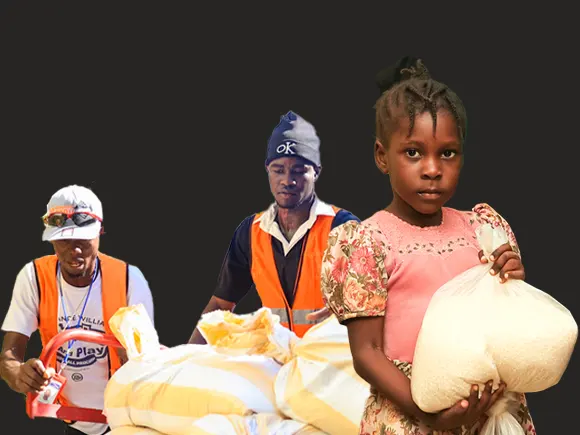THE BEGINNING
About two hours before the “sinister” hit Haiti, I was on my way to the Miami Airport to take a flight to the Dominican Republic (DR) to meet with the country’s president. On my way there, I received a call advising that he would not be able to meet with me. I decided to cancel my flight.
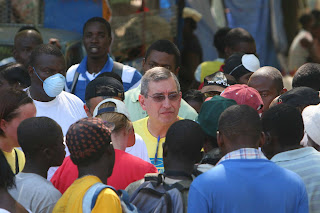 When we first learned of the earthquake, we could not have imagined the extent of the devastation, despite the announced 7.0 magnitude. Food For The Poor had a missions group traveling in Haiti at that time including 12 Lynn University students, two faculty advisors and our director of Food For The Poor’s (FFP’s) Mission and Travel Department, Leann Chong, who was leading the “Journey of Hope.” As part of their curriculum, Lynn students had established a program with us which included their students traveling with us to Jamaica and Haiti, their purpose being to see first-hand and come to better understand the extreme poverty of developing nations and learn more about some of the possible solutions. This was their third trip with us.
When we first learned of the earthquake, we could not have imagined the extent of the devastation, despite the announced 7.0 magnitude. Food For The Poor had a missions group traveling in Haiti at that time including 12 Lynn University students, two faculty advisors and our director of Food For The Poor’s (FFP’s) Mission and Travel Department, Leann Chong, who was leading the “Journey of Hope.” As part of their curriculum, Lynn students had established a program with us which included their students traveling with us to Jamaica and Haiti, their purpose being to see first-hand and come to better understand the extreme poverty of developing nations and learn more about some of the possible solutions. This was their third trip with us.
Their first trip to Haiti with FFP, one that I was fortunate enough to share with them, inspired them greatly. Upon their return, they formed an organization on campus called “Students for the Poor.” This organization would bring awareness to others of the suffering of the poor which they had witnessed, as the members would organize activities to raise funds for different projects that would help alleviate the tremendous suffering.
Our first news was that the entire group had been dropped off at the Hotel Montana in Port au Prince (PaP). My first thought was that since they were staying at what was considered the best hotel in Haiti, they would surely have survived without problem. As time passed, however, we saw photographs of the destruction of the hotel on television. We were extremely afflicted by the sight of that once beautiful, solid structure transformed into a mountain of rubble. The staff at FFP prayed unceasingly after that moment.
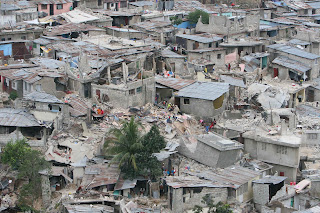
Despite besotting God with constant prayers and supplications, four of the students and both faculty advisors were lovingly called to a peaceful painlessness and are now in the warm, eternal embrace of our Heavenly Father. Mercifully, eight of the students survived without any physical harm, although one may well imagine the depth of their emotional/psychological scarring.
Leann was buried under the rubble for 17 hours, until a Good Samaritan heard her faint voice as he walked by the area where she was buried. Fortunately, this kind and very determined man continued digging until he reached her and ultimately saved her life. Leann’s hair had to be cut in order to set her free and a door was used as a stretcher to lift her out of her temporary prison. She was then airlifted to a hospital in the DR where she began her long process of recuperation that continues unto this day. I am very happy to report that she returned to work some weeks ago to the warmest of welcomes.
I ask everyone to pray for those who survived the earthquake and also for the families and friends of those who did not. Their suffering, due to the loss of their loved ones, has been an almost unbearable cross to bear and their pain is nothing short of palpable.
THE URGE
Shortly after the earthquake struck Haiti, I felt a painful yearning in my soul to return to this beloved land that had already suffered more than its share of anguish, even before this disaster. Yet, I realized that I had three major obstacles to overcome: Firstly, FFP, as the major provider of aid to Haiti and employing a staff there in the hundreds, is always sought out by the media with a view of getting information and updates on the current state of affairs in the country. As the media spokesperson, I felt at first that I could actually do more good for the country at home, by increasing public awareness of what was happening, rather than by being there in person; secondly, my wife was very concerned that the situation was too dangerous (unrest, looting, etc.) for me to travel there; and thirdly, my boss (the President and CEO), who truly has a fatherly, protective attitude towards his staff, shared my wife’s misgivings about my traveling to visit Haiti so soon under these dire circumstances.
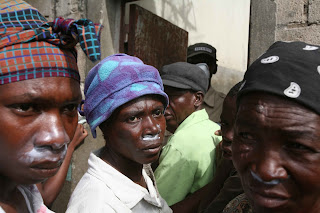 A few days later, the continuous requests for interviews began to slow down a bit, and, as if to aid my cause, the media was requesting interviews of someone actually in the field. I wore my wife and boss down with mega-doses of discussions in defense of my position to return to Haiti – not to mention my unrelentingly persistent nagging. I felt a hunger that could only be satisfied by my presence in Haiti and six days after the earthquake my journey began. There were no passenger flights allowed into PaP at the time, but I was able to enter by land through the DR. Finally!
A few days later, the continuous requests for interviews began to slow down a bit, and, as if to aid my cause, the media was requesting interviews of someone actually in the field. I wore my wife and boss down with mega-doses of discussions in defense of my position to return to Haiti – not to mention my unrelentingly persistent nagging. I felt a hunger that could only be satisfied by my presence in Haiti and six days after the earthquake my journey began. There were no passenger flights allowed into PaP at the time, but I was able to enter by land through the DR. Finally!
THE FIRST LEG
My journey began at Miami International Airport, as I sat at the gate, uncharacteristically early – I was taking no chances on missing this flight and used the time answering numerous e-mails from work. While waiting, I heard a gentleman speaking in Spanish on his cell phone about his desire to do something to help Haiti. I wanted to speak to him, but he remained on the phone the entire time before we boarded our flight.

As fate would have it, he sat next to me on the plane. I introduced myself and told him that if he wanted to help Haiti, he was sitting next to the right person. He told me that he was a businessman who owned eight computer stores in the DR. He explained that the next day was a public holiday in the DR, that his trucks would not be used and that he would be happy to lend them to us to transport whatever we had over to Haiti. I explained that we would be leaving for Haiti at the break of dawn the next morning and that we already had five trucks with food, medical supplies, water, 1,200 gallons of diesel, and a flatbed with 1,000 100lb-bags of cement.
He truly looked disappointed, so I suggested that he fill some of his trucks with water and join us at 4:00 AM for the journey. He said he would try and asked how he would be able to confirm the arrangements. I explained that we would be holding a press conference that night at the hotel to announce FFP’s plans for Haiti and he could call me there. He actually turned up at the conference, which was very well attended by all media, and he told me that he would meet us at the border town of Jimani the next morning with two truckloads of water. He was true to his word!
At Jimani, I realized that the press conference had been successful, as the truck drivers in line with me to be vaccinated and take malaria pills before crossing over were asking me, “Were you the man on TV last night?” I noticed that the attitude of Dominicans to the people of Haiti had softened considerably. Haiti, in its glory days, had taken over the DR by force of arms for 21 years, and, now that the balance of power had shifted drastically, few Dominicans had forgiven or forgotten. It’s amazing how extreme suffering can soften the heart of a people!
The border at Jimani had become a huge market, where Dominicans brought their wares. Many going into Haiti bought the goods to take for their families or for resale. Water and food were the main items, but there were also other necessary emergency supplies.

When the time finally came to leave, I decided that I didn’t want to enter Haiti in the SUV that had brought me to the border, so I decided to ride on one of the trucks where the driver did not have a wingman. The only two available were the truck with diesel fuel and the flatbed with cement. Remembering well the condition of the roads in Haiti, I opted for the cement. Besides, I had never ridden on one of those huge flatbeds and, additionally, it had a great symbolism of the content being the beginning of the reconstruction
of Haiti for FFP. I climbed in, feeling that I was
more in a plane than in a land vehicle, but the road would be a sharp reminder of the reality of the ride.
HAITI AT LAST
As we crossed the border, surrounded by a swarm of mopeds, motorbikes, “tap-taps” (covered, brightly painted pick-up trucks, commonly used in lieu of a public bus service in Haiti), and overloaded cars, we noticed a gentleman in distress. He was riding a moped and carrying, incredibly, five large cases of bottled water. One had dropped, no one was stopping, and he faced the dilemma that if he got off to pick it up, he would need someone else to load the moped as he sat on it. I asked the truck driver to stop and I placed the fifth case on top of the others, held in place by his chin. He gave me a huge smile and a soft “mesi.” It felt good to be back in Haiti!
THE OFFICE
It took about an hour to get into PaP, and as we got closer to the capital, the devastation became more apparent. When we got to our office, I found that the staff was functioning as if in a daze. I tried my best to comfort them. Many said that they felt completely numb. They just could not feel anything. I told them that it would get better eventually, but they just shook their heads in dismay. “You haven’t seen our downtown yet,” someone muttered, “it’s gone.” Mercifully, we lost none of our staff at the office, perhaps because they were at the office. Yet there wasn’t one person who did not have a deep sense of loss. Some had lost their children, parents, siblings, other relatives or close friends – a new period of mourning for an already grieving nation.
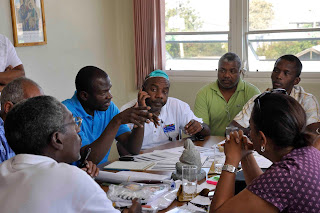 I hurried to see my friends at our feeding center, where a large percentage of the staff had turned up from the very beginning to cook the first of thousands of hot meals served to the suffering poor of PaP after the quake. I asked them, “Ki jan nou ye?” and they answered, “M’ papi mal, gras a Dieu.” To answer, “Not bad, by the grace of God” seemed so noble and faith-filled. I noticed a young man looking particularly sad and I asked about his family. He had lost his four-year-old son to the “sinister.” I hugged him and
I hurried to see my friends at our feeding center, where a large percentage of the staff had turned up from the very beginning to cook the first of thousands of hot meals served to the suffering poor of PaP after the quake. I asked them, “Ki jan nou ye?” and they answered, “M’ papi mal, gras a Dieu.” To answer, “Not bad, by the grace of God” seemed so noble and faith-filled. I noticed a young man looking particularly sad and I asked about his family. He had lost his four-year-old son to the “sinister.” I hugged him and
he cried, and my heart was filled with sorrow for his unimaginable pain – a suffering shared by so many in Haiti during this horrible time.
Our own Lesly Clervil, a Haitian-born projects coordinator for Haiti at our office in Coconut Creek, had gone to Haiti on the job a few days before I arrived. There he found that his family home in Haiti had collapsed, killing his mother, two aunts, two cousins, an infant and a visitor who, to this day, has not been identified. Before we left Haiti, he had the sad task of placing the remains of his family members in body bags, as they were recovered, and taking them in the back of a truck to the cemetery, where he would lay them to rest in the family grave. Despite the magnitude of this tragedy, he was more fortunate than many.
THE MONTANA
On the way home that evening we stopped at the Hotel Montana, from where Leann had been rescued after her 17-hour ordeal and where eight of the 12 students from Lynn had been found unharmed. Unbeknown to me at the time, I was standing before the original burial site of those six martyrs from Lynn who had given their lives for love of the poor and for love of justice.

The stench of death was everywhere in the city, but at this moment it seemed to penetrate my body and enter my soul. Later that night, I would blow my nose till it bled, trying to exorcise that sickly, musky scent. It didn’t work.
I gazed over all those standing on the all too familiar driveway of the Montana, as they were hoping to hear some good news about their relatives that had yet to be found. They were hoping that the operation was still classified as “rescue” and not “recovery.” I spotted one of the owners of that memory-filled place, Garthe, and I hugged her. She sobbed repeating, “I am sorry. I am so sorry.” I told her that this disaster was not her fault.
She told me that her grandson was not yet found, the sadness in her eyes betraying her astute suspicion that he might never be found alive. I asked her about certain employees who had served our groups for many years, because they had become much more to us than hotel employees. Some had survived; others were not so fortunate.
THE TENT CITIES
The next morning we visited the newly formed “tent cities.” There were not many there with actual tents – often just a bed sheet, a curtain, or a piece of tarp on a few sticks. PaP had become a city of cities. Displaced people – refugees in their own country – captured all available open land, without a nearby structure. The camps varied greatly in size from the smallest (100 people) to the largest (50,000 people) and, even with these conditions, some seemed more prosperous than others.

Friends of FFP(Haiti) helped organize community leadership in the tent cities and, that day, we were able to distribute truckloads of desperately needed food and shoes to many of the camps. We were also aided in that effort by 150 military reservists sent by the Jamaica Defense Force to FFP(Haiti) in order to protect our warehouse (on the grounds of which they had set up camp). They assured orderly distribution and helped repair the damages we had suffered in our complex and our program structures.
CITE SOLEIL
That afternoon we visited the 70-home village built by Food For The Poor in Cite Soleil and I learned that only one home sustained serious damages. I was very happy that the other 69 were in excellent condition. Most of our homes in the affected areas stood up very well to this disaster. We have submitted new plans to the government for approval with even more rebar reinforcement.
In general, all the buildings from where we work fared pretty well. The worst damage was at our offices/warehouse/feeding center complex, where our meeting room collapsed entirely (mercifully, there was no one there). We lost the top sections of walls in the warehouse and there were some cracks in the structure. This, however, did not impede the progress of our work in Haiti.
Our orphanages, schools, home for the elderly and home for children with different capabilities suffered only minor structural damage and the more serious issues involved the peripheral walls of these centers. Unfortunately, of our more than 400 employees in Haiti, we lost two who work second shift for us, and who were home at the time of the quake. Sadly, we also lost one of our orphans at the older girls’ home, as a wall collapsed on her and broke her neck. The girls from that home were moved to our village for the elderly and both generations were getting along famously when we visited.
CITY OF HOPE
On this morning, the Archbishop of Port au Prince was buried. He was crushed to death at his residence, across the street from the Cathedral of PaP. He will truly be missed. On the way to the office, we again stopped at the Montana to check if there had been any new developments. A sea of sad, nervous, anxious faces was already there, also waiting for news… good news. There was none.
Once again, I went to the office, determined to cheer up the staff and support the administration, with some measure of success. At times, I could make them laugh. At times, they would make me cry.
We then had an amazing visit to one of the tent cities that seemed to be organizing itself very well, with the guidance of the chairman of the Board of Directors of FFP(Haiti), Daniel Rouzier, into a micro-city within a city. There were 6,000 residents there – with only seven portable toilets! I worried about the possible health problems that this could create. I noticed, for the first time since I had arrived, that the mood of the people here had changed to survival mode. Walking around the area, I met a teacher, a lawyer and a politician or two. The earthquake showed no social prejudice. The teacher’s moped survived the quake and it had now become, by necessity, a taxi, and he a taxi driver.

The camp was neatly divided into rows, with some amount of specialization for those who were selling goods or supplying services. Food was the theme of the first row. There were residents selling rice, others selling beans, others bread and others drinks and water. The one who impressed me the most was an aged woman who was calmly stirring a dutch pot on a wooden fire. The pot had peanuts and sugar and she would drop the mixture unto an old metal sheet she had next to her to cool and become peanut brittle – survival!
The next two rows were even more interesting. Eight women were standing behind short, makeshift stools, braiding the hair of other women who were happy to relieve themselves of the maintenance for a few gourdes. But my favorite was the next row, where four creative and entrepreneurial men had rigged four car batteries and were charging cell phones, charging a couple of gourdes. Business was brisk! The cell phone companies in our countries have made sure that no one is too poor not to have a cell phone.
After this visit, we drove around many of the tent cities that we had previously supplied with food, to ascertain proper distribution. We were happy to see most families there enjoying a meal of rice and beans. It was heartbreaking to see so many children in the camps. Often they were new orphans for whom an aunt or family friend was now caring without the means to do so. I realized how much our help was needed in Haiti, now more than ever before.
MATERNITY
At around noon, FFP got a call from a private maternity hospital, that, because of the large number of injuries and the increased demand for medical attention, had become a public general hospital. They needed large tents, as they did not have room to keep patients that needed further attention and were forced to send them home before completing their care. They were also short of basic medical supplies. In Haiti, it is customary for the patients’ families to cook and bring food for their hospitalized family members. The recent tragedy had reduced dramatically the possibility of continuing this custom. The hospitals were faced with being entirely responsible for all of their patients needs. They were desperate for food. In less than 4 hours, an FFP truck pulled up to the hospital (we had driven there to receive it) to deliver all of the requested items and more. The unloading effort was nobly aided by the aforementioned Daniel Rouzier and me, bringing to consciousness some muscles that I had long forgotten existed! :o)
DOWNTOWN
On this morning, we would finally visit the downtown area. I was filled with apprehension and anticipation of what I would see there. I tried to prepare myself for the worst, but I could never have imagined the horror of the reality. It looked as if a fleet of war-planes had repeatedly bombed the area… it looked post-apocalyptic… it was, with little exception, all rubble – “kraze.”
As we came out of the car, we smelled the all too familiar stench of nearby death. Sure enough, the St. Vincent de Paul home for the handicapped had collapsed. We heard that there were seven casualties and many injuries, but the survivors had been moved to a place outside of PaP for care. The front building had collapsed forward into the middle of the street, and when we looked under the rubble, we saw the decomposed bodies of the man and the woman who were in a vehicle. Looking a little further, we noticed the wheel of a bicycle sticking out of the rubble and soon discovered the equally decomposed body of its rider. I thought of the scriptures that refer to death coming like a thief in the night. I imagined that these three victims might have felt safe because of being in the middle of the street. I wondered if they even saw it coming.

We then passed the completely destroyed but once beautiful Episcopal Cathedral and drove to the remains of the Roman Catholic Cathedral that once dominated the downtown area. I had enjoyed this place on so many occasions over the years and had always felt that its state of disrepair added to its beauty. It seemed to echo the condition of poverty of its people and stood there in empathy. We climbed inside through the mountains of rubble and exposed rebars, as if to verify its condition of total destruction.
We walked all the way around it, and, by the side door towards the façade, we saw three more bodies in an attitude of panic, crushed as they were about to exit the doorway. Just a few more seconds… just a few more steps… I think we’ll make it… Life can be fickle, so fragile.

While preparing to go to Haiti, I was not troubled at the thought of seeing dead bodies. After all, in Cuba, we waked our dead at home. There was no embalming and no waiting a week for burial. The dead were waked overnight and buried the next day. Curiously, the children were not excluded from this process. My grandfather died when I was ten. He was waked at home that night and, before going to bed, all the grandchildren processed into the room where he lay and kissed him good night. Yes, I was prepared for death. What shocked me was the decomposition – the hair that fell off the scalp, the desiccated limbs, the smell that enveloped the area, the expression of horror on the skeletal faces… I started having nightmares while still in Haiti related to these elements. Just now they are beginning to subside, but I have absolutely no regret of having gone.
GENERAL HOSPITAL
Still downtown, we visited the “Hopital General.” Because of overcrowding and structural damage, all available space was taken up with large tents. There were doctors and nurses there of all nationalities and the patients appeared to be getting excellent care, despite the physical conditions. Bonnie and Ben (FFP writer and photographer, respectively) have done a wonderful job of sharing the stories of Gilbert and Rosama (his mother), and also of little Oresto and Jean (his father) that we experienced in the pediatric tent.
My Creole came in useful at this time, as I was able to speak and comfort some of the children and console some of the parents. I was even able to act as interpreter for some of the foreign nurses. One of the parents to whom I spoke was the mother of a tiny six-month-old infant. The little girl was small for her age and, added to the problems of diarrhea and vomiting, she was also bleeding. As I was leaving, I saw the mother sitting next to the crib eating a little rice and beans and the father, whom I had not met, was holding little Josette-Marie. He saw my bright yellow shirt with Food For The Poor on it, and he stopped me. He told me that all of Haiti was grateful for the help that we gave to his country. He added that they prayed for us and for our benefactors every day. I know that we often say that the poor pray for us, but hearing this poor man, holding in his arms what was possibly a dying child, graciously saying to me that they pray for us every day – the words became flesh! I cried.
This was not the only moment of inspiration that I witnessed on this journey. The leadership and staff of FFP(Haiti) performed admirably under the most harrowing of conditions and continue to do so. Two days after the earthquake, FFP(Haiti) was delivering medical supplies that had come over from our people in the Dom. Rep. (5 trucks). By the next day, food was being delivered throughout the city, and less than a week after the “sinister,” FFP served the first hot meals in PaP from our feeding center. This, and much more, while dealing with the fears and pain brought about by the unexpected catastrophe.

At night, as we drove to our resting place (Clement’s home in my case), we had to drive carefully, not just because of those who had sectioned off part of the road with rocks so as to carve out a place for themselves to rest and sleep, but also because there were many groups who were gathering in the streets to sing praises to God and to give Him thanks for their blessings. Perhaps a large percentage of those praying in the streets in groups could not read or write, yet they had the wisdom to understand that “church” is not the building that may have been destroyed, but rather that they are “church” – the body of Christ. The people of Haiti will not curse God and die.
A priest in Haiti, who has served FFP as a speaker on occasion and who is a rector of a faculty of a university that was destroyed, came by to visit us at the FFP offices in PaP. I discovered then that he was living in one of the smaller tent cities. He came to see if we had a spare tent for him. Msgr. Andre Pierre is a well respected and well liked man of God in Haiti and I know for a fact that he could have easily found an offer to put him up without much effort. I believe that he chose to be amongst his people. There was a glow about him when he spoke of living at the tent city and going from place to place, offering the holy sacrifice of the Mass. He has my respect, admiration and affection.
At times, the macro things are the ones that are publicized and make the news, while the micro things are ignored. Two such micro actions really inspired and moved me on this trip. I was told of a woman in the Dominican Republic that lived in one of the poorest ghettos there. Every morning she brewed five gallons of tea and exchanged it for canned food items to send to her brothers and sisters in Haiti who were in more need than she.
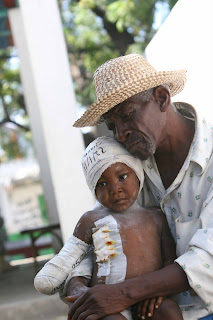 While in Haiti, I heard of a number of women who had suffered one of the greatest losses of all – they had lost their infant children, their babies. These women, in the midst of their great sorrow, volunteered to breastfeed infants who had lost their mothers. How could a woman give more of herself than that?
While in Haiti, I heard of a number of women who had suffered one of the greatest losses of all – they had lost their infant children, their babies. These women, in the midst of their great sorrow, volunteered to breastfeed infants who had lost their mothers. How could a woman give more of herself than that?
Is there hope for Haiti? How can there not be? In Haiti, I met many people who had lost their homes, their furniture, all their earthly possessions, and, worse of all, their family members. Yet, I never met one Haitian who had lost their hope. There will always be hope for Haiti!
The morning of my departure to the Dominican Republic, the FFP (Haiti) staff gathered on the open area next to the warehouse dock to hear my words of farewell. I truly left a piece of my heart with them.

